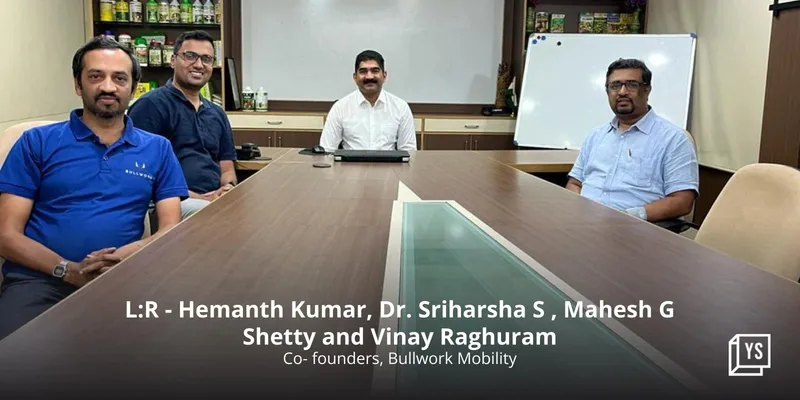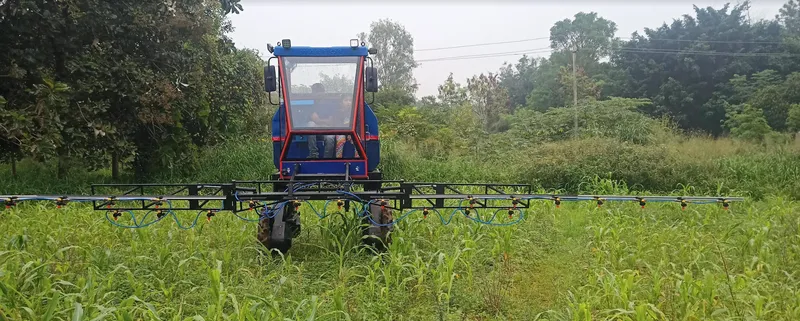Bullwork Mobility's autonomous EVs aim to change the future of farming
The Bengaluru-based startup is developing autonomous electric vehicles for the agri sector with an aim to bring down the operational cost for farmers.
The Indian agri sector is plagued by several problems such as poor infrastructure and outdated farm technologies, among others. Tractors and other vehicles used by farmers have low efficiency due to legacy IC diesel engines, which are noisy, polluting, and highly labour-dependent. Finding labour for manual work is another challenge in itself.
Bengaluru-based is looking to address these concerns by developing smart, connected, and autonomous electric vehicles (EVs) for the agri sector. The startup was founded by Mahesh G Shetty, Hemanth Kumar, Vinay Raghuram, and Dr Sriharsha S in 2021.
“The biggest social impact of electric vehicles is that they are cheaper to operate. Imagine a tractor that consumes about 3-4 litres of diesel for every hour of operation. This means that farmers spend about Rs 300-400 per hour on diesel. This is a very big amount for a marginal farmer. With our machines, we can bring down this cost to Rs 50 for every hour,” Hemanth tells YourStory.

The founding team
Building tech solutions
Bullwork's EVs are designed with advanced drive-by-wire technology, meaning they use electronic systems to connect the entire system and make them autonomous.
“These vehicles have very low operational cost, thus adding value to the customer. We are also developing a vision-based system for autonomous control and offer a safer operation for agri and utility machines,” says Hemanth.
The startup is also leveraging technologies like Machine learning (ML) and Artificial Intelligence (AI) algorithms to boost crop yield.
“Our machines enable us to gather data on the crop and help with yield prediction, smart health monitoring, and precision farming,” he adds.
To tackle labour issues faced by the agri-sector, Bullwork has developed autonomous robots to enable more work with less human intervention. By reducing the usage of fossil fuels, the startup is earning carbon credits as well.
Vinay says, “We are offsetting carbon emissions of these machines. As the volume of electric vehicles and their utilisation increase, we will get more carbon credits. We have already tied up with Carbon Registry India to enable this.”
The product
Bullwork Mobility has developed two products—Bullwork Warrior and Vamana Unmanned Ground Vehicle (UGV).
Sriharsha says Bullwork Warrior is one of the first fully-electric high-clearance boom sprayers in the country. It has four independent drive systems that provide power directly to the wheels, and has a 12-meter boom that can cover four to five acres of spraying area per hour.
“Our machines are cost-effective to operate and can be used by the farmer on a daily basis. Bullwork Warrior can do 25 acres a day, whereas the current process, which is manual, can do about 3-4 acres in a day,” Mahesh adds.

Bullwork Warrior
“We have developed a unique suspension system that makes this vehicle very safe to operate. The machine can carry 900 litres of water on board. It has a unique height change feature which can be adjusted as per the crop height. The height can go from 3.5 feet to 4.5 feet,” says Vinay.
Its second product, Vamana Unmanned Ground Vehicle (UGV), is a multipurpose agri robot that can do multiple activities like load carrying, tilling, spraying, etc.
Without disclosing the price of Bullwork Warrior, Vinay says that it is cost competitive compared to the diesel version available in the market. On the other hand, the Vamana UGV is priced between Rs 4-5 lakh.
The startup, which has already sold five Bullwork Warriors, is manufacturing these at its 150,000 sq. ft facility in Bengaluru.
The vehicles are being tested in Kundapur and Bidar in Karnataka, and the first deployment will happen in Punjab.

Vamana Unmanned Ground Vehicle
The team
With extensive experience in the EV, agri, drones, and automobile space, the co-founders were clear that electric mobility is the next big thing, and they got together post-COVID-19 to start Bullwork Mobility.
Hemanth says, “The electric vehicle market today is saturated with two, three, and four-wheeler vehicles. There were a handful of companies that were focusing on bringing electric drive trains to the agri sector. We realised that this is an untapped market, which has a high potential of being the next big sector for electrification. We thought of using our expertise to create technology and products which can bring value to the customers.”
The startup now aims to expand its 28-member team to develop its technology roadmap as well as the manufacturing setup.
Speaking about challenges, Hemanth says, “Winning customer trust in the adoption of these new technologies is a key challenge that we are addressing. The other side is the wide spectrum of requirements that comes from the farmer side, as it ranges from region to region, and at Bullwork we are continuously optimising our product lines to increase affordability to our end users. Apart from this, the current VC funding ecosystem takes a lot of convincing to invest in a deep-tech product business. "
Business model and way ahead
According to a report, the Indian agriculture equipment market reached a value of Rs 92,600 crore in 2021, and is expected to reach Rs 1,68,900 crore by 2027, exhibiting a CAGR of 10.6% during 2022-2027.
Speaking of competition, Vinay says, “We believe conventional machines are our competitors. There are a lot of electric agri equipment companies that are coming up. However, we are not in the retrofit game.”
“Our approach for the product has been a complete re-thinking from the ground up to be electric and drive by wire design, which enables us to do a lot cooler things in terms of giving customers driver optional operation, automating laborious and repetitive tasks through our autonomous tech stack, etc.,” he adds.
Some of the other tech companies offering similar vehicles include John Deere, Escorts, Monarch, and Sonalika.
The bootstrapped startup follows both B2B and B2C model, and is not looking at the vehicle leasing model. Farmers can purchase directly from Bullwork Mobility or through dealers with whom the startup will be partnering.
Its other source of revenue includes vehicle service and spares. “The vehicles sold will have to be serviced and spares will have to be replaced. We will have the revenue stream for AMC as well,” adds Hemanth.
Bullwork also plans to monetise from its value-added subscription services. These include a health monitoring and farm analytics vehicle, which will use AI to monitor the farm and identify the health of the plants. Customers can avail of these services for an additional cost per month.
Apart from this, its electric vehicles will offset carbon emissions by cutting out diesel usage. The carbon credits that will be generated can be traded with companies that use carbon offsets.
Speaking about future plans, Dr Sriharsha says, “Once we have enough volume built, we will start building the charging infrastructure with sustainable resources to enable charging of our machines.”
Edited by Megha Reddy








